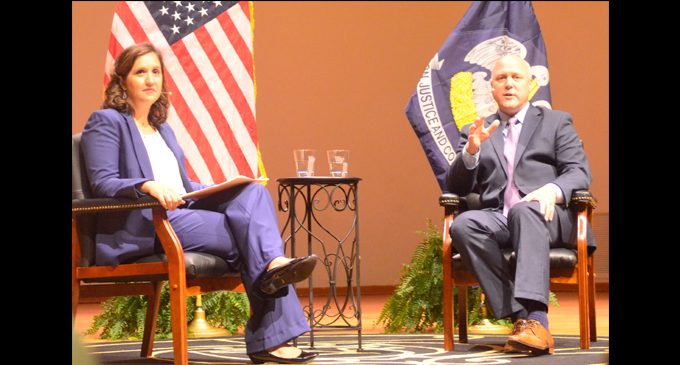Wake continues Voices of Our Time series with Mitch Landrieu
Mitch Landrieu (Right), former Mayor of New Orleans talks about his time in office during a recent speaking engagement at Wake Forest University.

Former mayor of New Orleans opens up on Katrina aftermath, Confederate monument removal
As part of the university’s Voices of Our Time speaker series, Wake Forest University recently invited Mitch Landrieu, former mayor of New Orleans, to discuss his time spent in office, how he helped lead the rebuild in the aftermath of Hurricane Katrina, and the removal of four Confederate monuments in The Crescent City.
Born and raised in the Broadmoor neighborhood of New Orleans, Landrieu’s political career began in 1987 when he was elected to Louisiana state legislature. As a state representative, Landrieu became well known as a reformer and an advocate for a non-partisan approach to government. Before being elected mayor of New Orleans, from 2004 until 2010 Landrieu also served as lieutenant governor in Louisiana.
After winning more the 60% of the vote in 2010, Landrieu was elected as mayor. When he came into office, Landrieu had to deal with a variety of issues. Less than five years removed from one of the worse natural disasters in American history, he also had to face looming bankruptcy, one of the highest murder rates in the country, a police department under federal investigation, and a slew of other problems, but he helped lead New Orleans through it all.
Landrieu said when he was faced with the daunting task of turning things around in New Orleans, he said his goal was to make the city better than it was before. He said being someone who had spent more than a decade in politics and grew up in New Orleans, although it was a great city, he knew it was time for a change.
“It (New Orleans) wasn’t great the night before Katrina hit. We, in fact, were a descending city,” Landrieu said. “In 1960 we were bigger than Houston and Atlanta. In 2005, August 28, the night before Katrina hit, we were getting smaller.”
While working with staff on the rebuild and working toward the 300th anniversary of the city, Landrieu said they came up with the notion that they shouldn’t rebuild the city the way it was, but the way it should’ve been. Under his leadership, the city received billions in federal funding for schools, hospitals, parks, and other infrastructure needs. He also helped reform the police department and the implementation of program that led to a 20% decrease in the murder rate.
While serving his second term as mayor, Wynton Maralis, a Grammy award-winning jazz musician and a longtime childhood friend of Landrieu’s, asked for a favor. He asked him to remove all the Confederate statues from the city. Landrieu said while catching up with Maralis over coffee, he asked him to look at the monuments from his perspective, a black man.
Landrieu said after thinking about it and doing more research, he found out that he had the power to have the monuments removed and the history behind the monuments.
The monuments in New Orleans were placed in various spots across the city more than two decades after the Civil War had ended by the United Daughters of the Confederacy, a national organization open to female descendants of those who fought or aided the Confederacy, and the same group who owned the statue that once stood at the corner of Liberty and West Fourth Streets here in Winston-Salem and others across the south.
After a long process, which included countless city council hearings, seven court cases, 13 judges, death threats, and a car bombing, the four Confederate monuments that occupied space in New Orleans were removed. The monuments were removed on the same day Dylan Roof killed nine people at a church in Charleston, S.C.
Landrieu said although removing statues was a start, it’s time that this country takes a real look at issues of race relations and institutional racism.
“The notion of white people are superior to black people is an insidious notion that continues to hover. It used to be under the surface, but it’s much more overt right now,” Landrieu continued. “In fact, I’m not just talking about individual acts of racism, I’m taking about institutional biases that we can actually trace back that have put African Americans and other minorities in a worse position, but it’s all based on this notion that some people are better than others.
“I kind of said to myself, you have to call the question. You have to face it, you have to confront it and you have to make a hard decision to not only take down the symbols, but you have to get into the root of what the cause is that has brought us to this point.”
Established in 2006, Voices of Our Time is a guest speaker series that brings some of the world’s leading thinkers to the campus of Wake Forest University. The series is designed to offer a unique opportunity for students, faculty and staff as well as members of our surrounding communities to hear from today’s most influential voices on important national and international issues.
The series will continue on Oct. 17 with guest speaker Anthony Appiah. For more information visit Wake Forest University’s official website and click on the “EVENTS” tab or http://events.wfu.edu/event/3rd_annual_noesis_lecture#.XYGiCbaZOu5.











